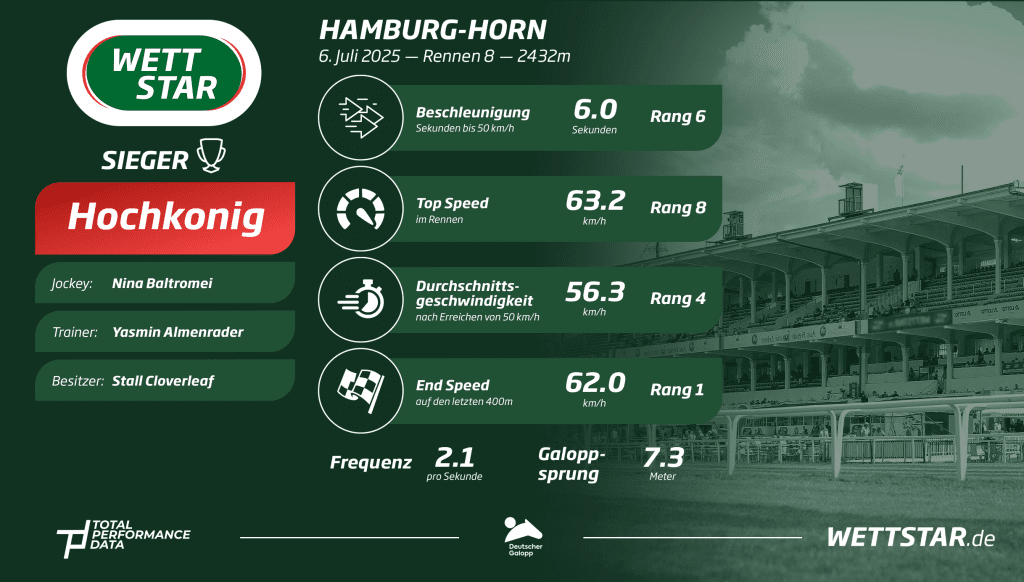IDEE 156th Deutsches Derby Review
An initial look at the replay for this year’s running of the German Derby might lead to the conclusion that the Karl Burke trained runner-up, Convergent, has been mugged on the line. Clifford Lee hasn’t done a great deal wrong and on another day, he may well have won. Taking 5.0s to reach 30 mph from the stalls (ranked 1st), he had the ideal prominent position heading into the bend at the end of the straight. Sent for home with just over 2-furlongs to run, he was a length ahead at the furlong pole and looked to have the race won, but Hochkonig and Nina Baltromei weren’t following the script. The race developed into a sprint with a finishing speed of 109.9% from the winner, but Convergent wasn’t slowing down to any significant degree in the final furlong and he actually increased his average stride frequency to 2.19 per second in the closing stages. A run-out speed of 36.75 mph was only surpassed by the winner and there is every reason to believe that Convergent has matched his earlier form from the Chester Vase, which in hindsight is working out to be one of the strongest middle distance races of the season. If we were to take this form at purely face value, then we should probably be talking about Hochkonig as a potential Arc horse.


A winning time of 2:37.10 was faster than the 2 previous winners of this race, Palladium (2024) and Fantastic Moon (2023) and ranks 5th in the last 10 renewals of the German Derby. The nature of the track at Hamburg and the tight turns often lead to races developing into a sprint finish as more emphasis is placed on track position rather than early pace. The pace certainly dropped to 13.5s+ furlongs with half a mile to run as the field rounded the final turn before the sprint began. Several of the jockeys that rode towards the rear elected to switch to the stands side, presumably in search of better ground, but the data would suggest that there was no obvious advantage to be gained by doing so. Nina Baltromei sat still and rode her race on the winner, who was the fastest horse in 3 of the final 4-furlong splits, closing his race in 11.53 and 11.72s. This was clearly a deliberate tactic, no doubt spawned from the fact that he hit the front too early in his warm up for this race in a Group 2 at Cologne 4-weeks earlier. That might be a little harsh given that the winner, Zuckerhut, was the fastest horse in the field for each of the last 4-furlongs, but he was only 6th on Sunday and a more patient ride saw Hochkonig readily reverse that form.
Having waited until the penultimate furlong to use the pro-cush, Nina Baltromei was able to get her mount to finish his race with the fastest run-out speed in the field at 37.49 mph after he ran down Convergent in the last 50-yards. His average stride length reached a race peak of 7.52m in the final furlong and there is certainly a sense from the data that he was only just getting going in the closing stages. The fact that the early pace was relatively steady has clearly been a contributing factor and he is far from guaranteed to get a similar setup next time, especially against the older horses. However, whilst this race has generated a fantastic media story with the success of Nina Baltromei and Yasmin Almenrader, who was winning her 2nd German classic of the year, underneath it all is a very promising set of data from a talented Colt. Whilst I’m in no particular rush to head to the nearest betting shop to try and find an Ante Post price for the Prix de L’Arc de Triomphe on the back of this, I will be following the career of Hochkonig with great interest and the data would suggest that he will be competitive in Group 1 company later in the year.